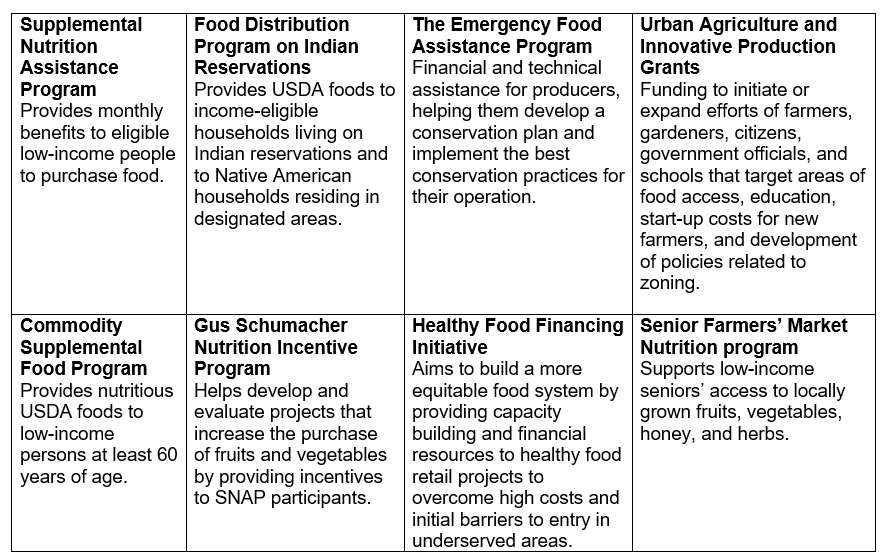The Farm Bill is a significant piece of legislation that establishes federal farm, food and rural policy. This legislation has a tremendous impact on both rural and urban communities, farming livelihoods and food economies, which in turn will affect the environment, local and regional economic growth and public health.
Congress is now working on the reauthorization of a bipartisan Farm Bill for 2023. NLC shared local government priorities for the next version of the bill with members of the Senate and House Agriculture Committees, including support for nutrition provisions.
The Farm Bill supports individuals’ and families’ access to nutritious food and the jobs of those that grow and raise the food. The nutrition title of the Farm Bill authorizes several federal nutrition programs, the largest program being the Supplemental Nutrition Assistance Program (SNAP).
Overall, SNAP is one of the most effective federal programs for reducing hunger – it expands automatically to meet individual needs during economic downturns, is targeted to those with the least resources and allows individuals to use the benefits at supermarkets or superstores. Nearly 41 million low-income individuals receive benefits monthly and nearly half of the participants are children. SNAP is a lifeline for many working individuals in occupations that provide low wages, offer unreliable hours and don’t provide benefits such as paid sick leave.
SNAP is an important program for rural and urban areas of the country, with research noting that in 2020 it reduced poverty in metro areas by 0.8 percent and in rural areas by 1.4 percent.
Here is a closer look at the nutrition title that supports families having food on their tables and the farmers, ranchers and growers who provide that food.
Title IV: Nutrition

The Nutrition section covers several programs to assist individuals, families, and seniors in gaining access to healthy food and traditionally accounts for nearly 75 percent of the Farm Bill’s funding.
In most cases, cities are not the administrator of these nutrition programs, but the impact of these programs on local residents will have a direct impact on a city’s local economy, food banks, school meal programs and supportive services.
Farm Bill, the End of the Pandemic and the Debt Ceiling
With the end of the Public Health Emergency (PHE), several temporary SNAP measures have ended. Benefits for able-bodied adults without dependents (ABAWDs) will again be limited to three months of benefits. Many will lose their benefits starting in October 2023. Additionally, college students who received a temporary exemption under the PHE will be reassessed over the next 12 months meaning many will no longer receive benefits. If your residents have questions about SNAP benefits, they can contact their state human services agency.
The House passed the Limit, Save, and Grow Act to limit spending and raise the debt ceiling through March 31, 2024, or a $1.5 trillion increase from the current ceiling, whichever comes first. Negotiations are continuing, but work requirements for people who receive SNAP benefits are currently under negotiation. The proposal would expand additional work requirements for those who receive SNAP benefits but do not have children currently capped at age 49 to age 55. Raising the age to 55 could impact approximately one million SNAP recipients, according to the Center on Budget and Policy Priorities. Learn more about the latest debt ceiling negotiations.
Timeline and Call to Action
Congress has already begun the reauthorization process by soliciting stakeholder input, including holding preliminary hearings in both the House and Senate Agriculture Committees. As Congress works on drafting language for the next Farm Bill, now is an important time for local leaders to advocate for the programs and policies that impact their communities.
If Congress does not pass a bill reauthorizing the programs in the Farm Bill by September 30, they must pass a short-term extension. A failure to reauthorize the Farm Bill in a bipartisan manner and timely fashion will have significant impacts on local communities and economies of both urban and rural landscapes.
NLC has shared a list of Farm Bill reauthorization priorities with the Senate and House Agriculture Committees. Local leaders can reference this letter to uplift these important local programs and policies. Reference the links below to see if your Member of Congress is on an Agriculture Committee.


